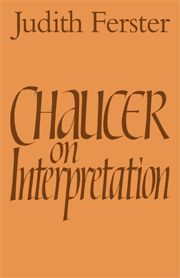Book contents
- Frontmatter
- Contents
- Preface
- 1 Introduction
- 2 Interpretation in the Knight's Tale
- 3 Reading Nature in the Parliament of Fowls
- 4 The Lady White and the White Tablet: The Book of the Duchess
- 5 Reading Griselda: The Clerk's Tale
- 6 Reading the Self: The Wife of Bath
- 7 The Politics of Narration in the Frame of the Canterbury Tales
- Notes
- Index
- Frontmatter
- Contents
- Preface
- 1 Introduction
- 2 Interpretation in the Knight's Tale
- 3 Reading Nature in the Parliament of Fowls
- 4 The Lady White and the White Tablet: The Book of the Duchess
- 5 Reading Griselda: The Clerk's Tale
- 6 Reading the Self: The Wife of Bath
- 7 The Politics of Narration in the Frame of the Canterbury Tales
- Notes
- Index
Summary
THE NARRATOR of Chaucer's Parliament of Fowls has stood pondering the inscriptions on the garden gate in his dream. Since the inscriptions are contradictory, one describing the garden as a paradise, the other describing it as a hellish desert, the narrator is unable to decide whether to risk entering. His guide, Africanus, explains that since the narrator has exempted himself from love, the inscriptions do not apply to him; they are addressed only to lovers.
With that myn hand in his he tok anon,
Of which I confort caughte, and wente in faste.
But, Lord, so I was glad and wel begoon!
For overal where that I myne eyen caste
Were treës clad with leves that ay shal laste,
Ech in his kynde, of colour fresh and greene
As emeraude, that joye was to seene.
(II. 169–75)Why is the narrator glad? Whether the garden turns out to be a paradise or a hellish desert should be merely a matter of scientific interest to the narrator. Perhaps his response is one of aesthetic pleasure. Perhaps there is a touch of relief in his gladness: If he does not completely believe that he is exempt from the gate's prediction, his pleasure at seeing the garden's beauty is not disinterested. Perhaps he is led to call the leaves evergreen by his desire that they conform to the inscription predicting a paradise where “grene and lusty May shal evere endure” (I. 130).
- Type
- Chapter
- Information
- Chaucer on Interpretation , pp. 1 - 22Publisher: Cambridge University PressPrint publication year: 1985
- 2
- Cited by



